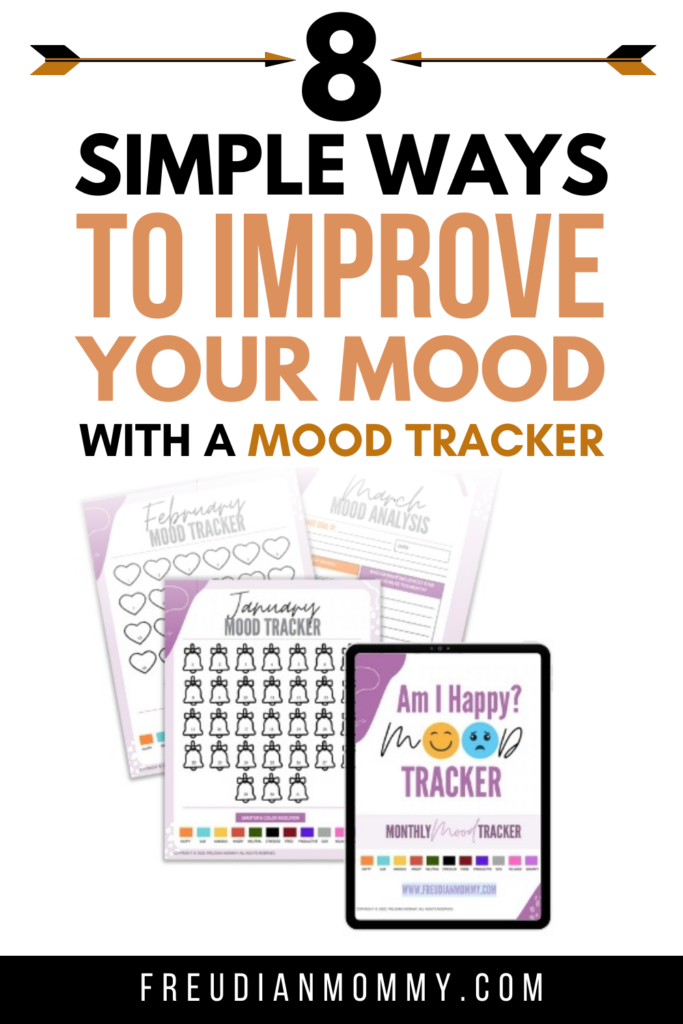Everyone gets moody; it’s a natural part of your emotional health. Your mood is not triggered by a specific person, event, or experience, and can last for hours to even days.
Your mood is not like your emotions. It is much more complex. Your emotions can easily and knowingly be triggered by your surroundings, such as people, places, and situations. And your emotions are merely for a minute.
However, it can be difficult to identify direct and obvious triggers that affect your mood as your mood is often a result of various components.
It is precisely for that reason I encourage using a mood tracker to track your daily mood. When you are mindful and aware of your mood, you can remove the very things you believe are negatively affecting you.

Two Types of Moods
There are two types of moods. Good or positive mood (e.g., happiness, excitement, love). And bad or negative mood (anger, frustration, anxious, annoyed). When you are in a good mood, you are more likely to experience positive emotions, and when you are in a bad or low mood, you are more likely to experience negative emotions.
Negative mood
A low or negative mood should sometimes go away in a few hours. However, if it sticks around for longer than it should, and interrupts your daily life consistently, it could indicate you are struggling with a mental illness. If you experience a low mood for more than two weeks, you could have depression.
Positive mood
Furthermore, when you are more positive, you tend to see the world more optimistically, and everything looks brighter. You make better life decisions that will likely enhance your life.
What is the difference between mood and emotions?
Although mood and emotions affect each other, they are different. Emotion and mood differ in duration. Emotions last from seconds to minutes, whereas mood can last for hours, days, and even weeks. It is easier to identify your emotional triggers, whereas it is much more challenging to determine your mood triggers.
Mood and mental illness:
Mental illnesses such as depression, anxiety, ADHD, substance abuse, bipolar disorder, and stress-related disorders can affect your mood.
Other factors such as a combination of poor sleep, interactions with the people around you, lack of exercise, poor nutrition, drugs and alcohol, physical illness, the news, and chronic pain can unknowingly affect your mood.
Treatment for low mood
If you experience low moods frequently, you could benefit from psychotherapy. Therapy helps you look at how you view the world, the people around you, and how your thoughts about these things may affect your mood (CBT).
The benefits of using a mood tracker?

A mood tracker is a powerful tool that can be used to improve your mental health. You record and track your mood every day and then analyze the results. A mood tracker is essential because it helps you understand and determine the people, places, events, or situations that may be affecting or triggering your mood.
If you track your mood long enough, you will begin to notice the patterns of negative triggers that influence your mood.
For example, suppose you get angry every time you speak to your older sister on the phone (and no, I am not talking about myself). In that case, that’s a significant piece of information that could help you better understand why you get so angry when you speak to your older sister on the phone.
How to use a mood tracker
Using a mood tracker is very simple. Most mood trackers work by having different shape designs and color codes, each identifying different emotions. Every day, you chose the color of the mood that suits you most of the day. Use the color pencil or crayon to fill the box for that day.
8 Simple Ways To Improve Low Mood:
1. Practice self-care

Do things that make you happy, like dancing, getting a massage, or watching your favorite movie.
I know you’re busy and have numerous responsibilities, but those things won’t matter if you are well enough to take care of them. For this reason, Your mental health needs should come before everyone else’s. Think of it this way, especially if you are a mom, wife, caretaker, etc., if you are not okay, everyone who depends on you will be affected.
You know, I often hear the phrase that “self-care isn’t selfish,” and that is absolutely true. Prioritizing your basic mental health needs isn’t selfish. On the contrary, it is wise and means that you recognize that it will cause a domino effect if you fall apart due to a lack of self-care.
2. Practice mindfulness
Focus on the here and now, and avoid worrying about the future or what happened in the past.
When you don’t focus on the present and what’s happening in the moment, you tend to miss out on significant moments that you can never get back.
3. Reach out to family and friends
Self-isolation can increase low mood. Talk to the people who make you happy, like close family and friends.
No, you are not a burden. Your family and friends love you and want to hear from you.
4. Reduce Stress
Don’t put too much on your plate; take it one day at a time. And if you must, take it an hour at a time. Go at your own pace. You are not in competition with anyone.
5. Practice relaxation techniques
Learn how to take deep breaths intentionally. Sometimes you’re so busy and preoccupied that you forget to take even a couple of deep breaths throughout the day. Release your stress through those intentional deep breaths.
7. Rest

It’s okay to take time off and recuperate. Don’t feel guilty. The more you take care of your mental health needs, the less likely you are to become overwhelmed.
8. Go to therapy
And lastly, if it gets to the point where nothing is working, seeking help from a trained mental health professional can make a world of difference.
Your Mood Matters
Your mood, positive or negative, affects how you think and respond to the many situations you are presented with every single day. Knowing your mood and the many factors that put you in that mood provide you with the information you need to make changes—your mood matters. Get your mood tracker here.












